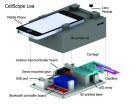(Press-News.org) Berkeley -- A research team led by engineers at the University of California, Berkeley, has developed a new mobile phone microscope that uses video to automatically detect and quantify infection by parasitic worms in a drop of blood. This next generation of UC Berkeley's CellScope technology could help revive efforts to eradicate debilitating diseases in Africa by providing critical information for health providers in the field.
"We previously showed that mobile phones can be used for microscopy, but this is the first device that combines the imaging technology with hardware and software automation to create a complete diagnostic solution," said Daniel Fletcher, associate chair and professor of bioengineering, whose UC Berkeley lab pioneered the CellScope. "The video CellScope provides accurate, fast results that enable health workers to make potentially life-saving treatment decisions in the field."
The UC Berkeley engineers teamed up with Dr. Thomas Nutman from the National Institute of Allergy and Infectious Diseases, and collaborators from Cameroon and France to develop the device. They conducted a pilot study in Cameroon, where health officials have been battling the filarial, or parasitic worm, diseases onchocerciasis (river blindness) and lymphatic filariasis.
The video CellScope, which uses motion instead of molecular markers or fluorescent stains to detect the movement of worms, was as accurate as conventional screening methods, the researchers found. The results of the pilot study, performed in Cameroon, are reported in a paper to be published Wednesday, May 6, in the journal Science Translational Medicine.
"This research is addressing neglected tropical diseases," said Fletcher. "It demonstrates what technology can do to help fill a void for populations that are suffering from terrible, but treatable diseases."
Battling parasitic worms
River blindness is transmitted through the bite of blackflies and is the second leading cause of infectious blindness worldwide. Lymphatic filariasis, spread by mosquitoes, leads to elephantiasis, a condition marked by painful, disfiguring swelling in parts of the body. It is the second leading cause of disability worldwide and, like river blindness, is highly endemic in certain regions in Africa.
The antiparasitic drug ivermectin, or IVM, can be used to treat these diseases, but mass public health campaigns to administer the medication have been stalled because of potentially fatal side effects for patients co-infected with Loa loa, which causes loiasis, or African eye worm. When there are high circulating levels of microscopic Loa loa worms in a patient, treatment with IVM can lead to brain or other neurologic damage that can be severe or fatal.
The standard method of screening for levels of Loa loa involves trained technicians manually counting the worms in a blood smear using conventional laboratory microscopes, making the process impractical for use in field settings and in mass campaigns to administer IVM.
The serious side effects of Loa loa and the difficulty of rapidly quantifying Loa levels in patients before treatment make it too risky to broadly administer IVM, representing a major setback in the efforts to eradicate river blindness and elephantiasis.
Next generation CellScope uses video, automation
For this latest generation of the mobile phone microscope, named CellScope Loa, the researchers paired a smartphone with a 3D-printed plastic base where the sample of blood is positioned. The base includes LED lights, microcontrollers, gears, circuitry and a USB port.
Control of the device is automated through an app the researchers developed for this purpose. With a single touch of the screen by the healthcare worker, the phone communicates wirelessly via Bluetooth to controllers in the base to process and analyze the sample of blood. Gears move the sample in front of the camera, and an algorithm automatically analyzes the telltale "wriggling" motion of the worms in video captured by the phone. The worm count is then displayed on the screen.
Fletcher said previous field tests revealed that automation helped reduce the rate of human error. The procedure takes about two minutes or less, starting from the time the sample is inserted to the display of the results. Pricking a finger and loading the blood onto the capillary adds an additional minute to the time.
The short processing time allows health workers to quickly determine on site whether it is safe to administer IVM.
"The availability of a point-of-care test prior to drug treatment is a major advance in the control of these debilitating diseases," said aquatic ecologist Vincent Resh, a professor at UC Berkeley's Department of Environmental Science, Policy and Management. "The research offering a phone based app is ingenious, practical and highly needed."
Resh, who is not involved in the CellScope project, has worked in West Africa for 15 years on the control of onchocerciasis.
The researchers are now expanding the study of CellScope Loa to about 40,000 people in Cameroon.
INFORMATION:
Co-lead authors of the study are Michael D'Ambrosio, UC Berkeley research scientist in bioengineering, and Matthew Bakalar, UC Berkeley graduate student in bioengineering. Other study authors included researchers from the University of Yaoundé in Cameroon and the University of Montpellier in France.
The Bill and Melinda Gates Foundation, UC Berkeley Blum Center for Developing Economies, U.S. Agency for International Development and NIAID helped support this work. The NIAID is part of the National Institutes of Health.
The rise of antibiotic-resistant bacteria is a growing problem in the United States and the world. New findings by researchers in evolutionary biology and mathematics could help doctors better address the problem in a clinical setting.
Biologist Miriam Barlow of the University of California, Merced, and mathematician Kristina Crona of American University tested and found a way to return bacteria to a pre-resistant state. In research published in the open-access journal PLOS ONE, they show how to rewind the evolution of bacteria and verify treatment options for a family ...
Scientists from the National Institute of Allergy and Infectious Diseases (NIAID), part of the National Institutes of Health, and the University of California, Berkeley, and colleagues have developed a mobile phone microscope to measure blood levels of the parasitic filarial worm Loa loa. The point-of-care device may enable safe resumption of mass drug administration campaigns to eradicate the parasitic diseases onchocerciasis (river blindness) and lymphatic filariasis (elephantiasis).
Efforts to eliminate these diseases in Central Africa through community-wide administration ...
Just witnessing aggression or other bad behaviour at work can affect our well-being, but the right support from employers and colleagues can limit the consequences.
That is the conclusion of research being presented today, Thursday 7 May 2015, by Dr Christine Sprigg from the Institute of Work Psychology at the Sheffield University Management School at the Annual Conference of the British Psychological Society in Liverpool.
Dr Sprigg and her colleagues surveyed 127 British employees who had witnessed aggression at work. Employees were asked to complete a number of psychological ...
Psychologists are to improve online health information on lung cancer after research showed that family members are more likely to search online to encourage loved ones to seek help.
This is one of the outcomes from research by PhD student Julia Mueller based in the School of Nursing, Midwifery and Social Work at The University of Manchester (part of the Manchester Cancer Research Centre) who will present her study today, Thursday 7 May 2015, at the Annual Conference of the British Psychology Society being held in Liverpool.
Julia Mueller said: "People displaying ...
Children are more likely to display troublesome behaviour in families in which the father feels unsupported by his partner.
The findings by Doctoral Researcher Rachel Latham from the University of Sussex will be presented today, Thursday 7 May 2015, at the Annual Conference of the British Psychology Society being held in Liverpool.
The ways in which parents work together in their roles has been shown to be an important factor in relation to the behaviour of their children. However, few studies have distinguished between mothers' and fathers' perceptions of the support ...
How to protect your chicks from predators? Build a dome over them! There is tremendous diversity among the nests of birds, in nest location, structure, materials, and more, but we know very little about the forces that shaped the evolution of this incredible variety. In a new paper published this week in The Auk: Ornithological Advances, Zachary Hall, Sally Street, Sam Auty, and Susan Healy of the University of St. Andrews in Scotland test the hypothesis that domed-shaped nests arose as a result of some species transitioning to nesting on the ground, where the risk from ...
Viewing violent news events via social media can cause people to experience symptoms similar to post-traumatic stress disorder (PTSD).
This is one of the findings by Dr Pam Ramsden from the Faculty of Social Sciences, University of Bradford that will be presented today, Thursday 7 May 2015, at the Annual Conference of the British Psychology Society being held in Liverpool.
Dr Ramsden explained: "The negative effects of exposure to other people's suffering have long been recognised in roles such as professional healthcare workers. Various studies have documented the ...
NEWPORT, Ore. - A new study on the impact of 'drive-hunting' dolphins in the Solomon Islands is casting a spotlight on the increasing vulnerability of small cetaceans around the world.
From 1976 to 2013, more than 15,000 dolphins were killed by villagers in Fanalei alone, where a single dolphin tooth can fetch the equivalent of 70 cents ($0.70 U.S.) - an increase in value of five times just in the last decade.
Results of the Solomon Islands study are being reported this week online in the new journal, Royal Society Open Science.
"In the Solomon Islands, the hunting ...
Male job applicants who are perceived to have high levels of leadership potential are rated as a better employment prospect than a female applicant with proven leadership track record.
This is the finding of a study by undergraduate student Fatima Tresh, Dr Georgina Randsley de Moura and Abigail Player from the University of Kent that will presented today, Wednesday 6 May at the British Psychological Society Annual Conference in Liverpool. The study was funded by a 2014 BPS Undergraduate Research Assistantship Scheme. The scheme marks out a student as a future researcher ...
New York, NY - Although rates of childhood obesity have risen over the last several decades, a vast majority of parents perceive their kids as "about the right weight," according to new research led by NYU Langone Medical Center.
The research findings appear online in the journal Childhood Obesity, and also included researchers from Georgia Southern University and Fudan University in Shanghai.
The authors believe it is the first study to examine the lack of change over time of parents' perception of their preschool child's weight status. The results are important, they ...


